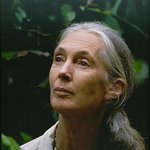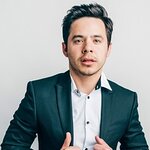By Anastasia Reid on
In this three part Look To The Stars special, the Jane Goodall Institute New Zealand invited us to share the stories of three high school students from across New Zealand who were given the opportunity to attend Dr. Jane Goodall's events and interview her. Below is the first article, by 14-year-old Wellington student, Anastasia Reid.
We can do it, but will we?
Dr. Jane Goodall teaches Wellingtonians about why it is important to take action against the climate crisis.
Behind every speech and answer that Dr. Jane Goodall gave, the key message was that there is hope but we need to walk the talk. She reinforced this message by telling stories and giving heartfelt examples of what she had witnessed during her lifetime. A piece of advice she gave me during my interview was that instead of blaming the government I should be taking action myself because that would be doing my part.
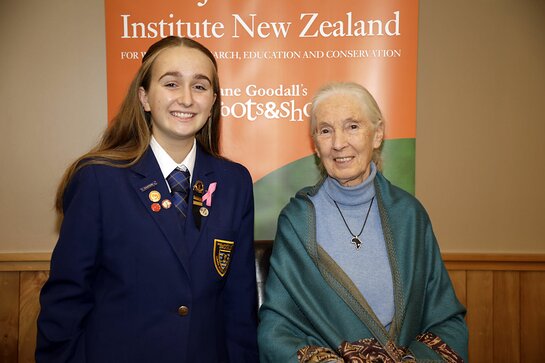
Credit/Copyright: JGINZ
She explained to me that, yes, previous generations have caused the climate crisis but we need to move on from blaming and pointing fingers and start working together in order to create a solution. Dr. Goodall believes that making more ethical and environmentally conscious choices about what you buy, and asking ourselves, ‘where did it come from, how was it made, and what was its impact on the environment?’ will help contribute to minimising the climate crisis. And she teaches us that by tweaking aspects of our day to day routines we can individually make a difference to decrease our combined environmental footprint.
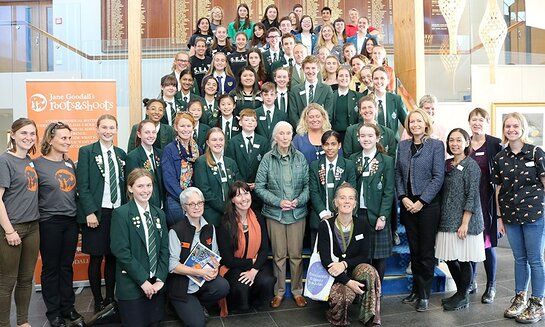
Credit/Copyright: JGINZ
Even though Jane believes that individual consumer choices have one of the biggest impacts on the environment, she says that governments also need to take responsibility and explore the options they have to make changes. Governments from all around the world could make legislation to reduce carbon emissions from businesses, and also to reduce the emissions caused by factory farming for animals.
But this won’t solve all our problems. From the food we eat to the cars we drive, we are constantly increasing our environmental footprint. A number one tip from Dr. Jane Goodall is to eat less dairy and less meat. This is because agriculture is responsible for ¼ of the world’s emissions. Dr. Jane Goodall strongly believes and reaffirms that, in her opinion, everyone has to do their part and we can’t expect someone else to do it for us.
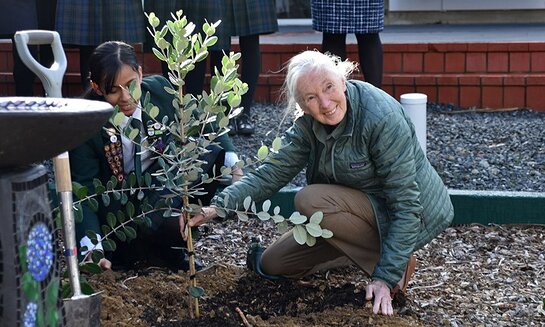
Credit/Copyright: JGINZ
To help give opportunities for the youth of society to get involved and help save the environment Dr. Goodall created Roots & Shoots in 1991 with 12 Tanzanian high school students. The Roots & Shoots programmes give children the opportunity to tackle urgent problems in their communities.
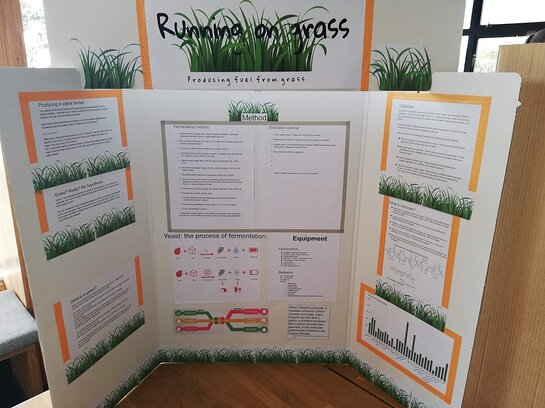
Credit/Copyright: JGINZ
Whilst in Wellington, Dr. Jane Goodall attended and spoke at the Roots & Shoots event organised by Marsden School, which welcomed students from over a dozen schools for the day. She inspired many different students from across the Wellington Region to take more action.
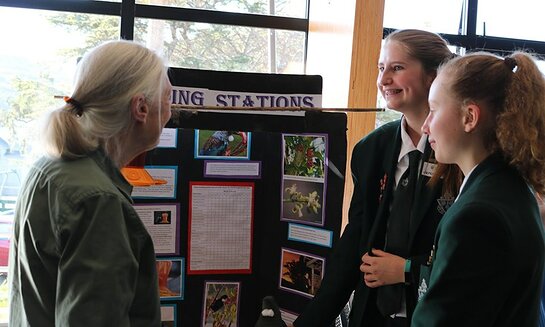
Credit/Copyright: JGINZ
Whilst reviewing and giving feedback on the student’s presentations Dr. Jane Goodall established a better connection to each of the students individually. Students from the event said that at the beginning of the event they didn’t really understand who she was but by the end, she had inspired them to raise more awareness and take further action in their local communities. Many students have a fond memory which they will remember forever of Dr. Jane Goodall saying “1, 2, 3, Chimpanzee!” when they were taking photos.
At the end of the week, Dr. Jane Goodall had made a huge impact on the people of Wellington. She had educated and inspired the city to take action to help prevent further damage caused by climate change. Students who have attended the Roots & Shoots event have now taken Jane’s message and shared it throughout their school by creating their own Roots & Shoots programmes or simply talking about the events which they attended with fellow peers and teachers.
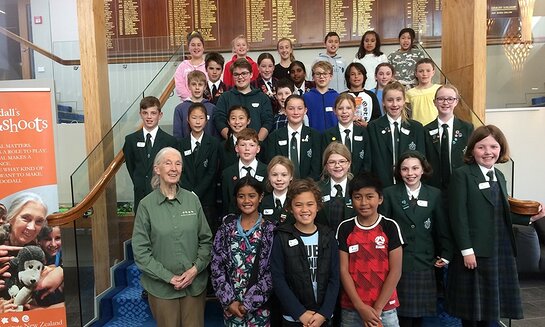
Credit/Copyright: JGINZ
This is showing us that within a week Dr. Jane Goodall has inspired thousands of people on a personal level. Because of this we can see and understand that it is possible to prevent further damage caused by the climate crisis the world is facing. Because of this, we should have hope.
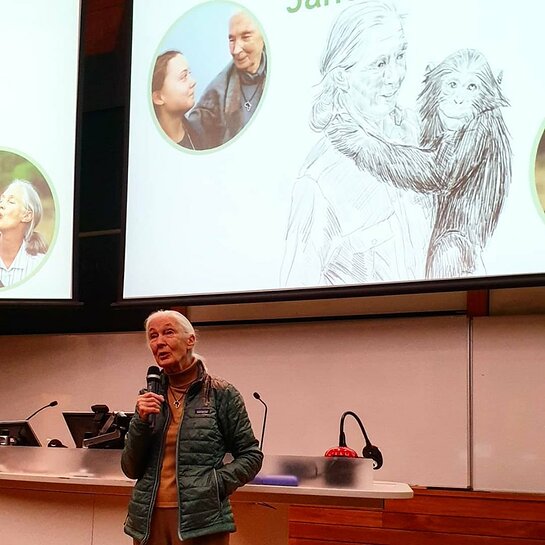
Credit/Copyright: JGINZ
Interview below:
A: Here in Wellington we have many students participating in the school’s climate change strike. How do you believe that my generation can make a change, other than voicing our opinions?
J: Well, I think one of the most important things to do is to think what you are most concerned about, whether it’s climate crisis, or whether it’s the pollution of the ocean, or the destruction of the forest, or the loss of species, and then get together with your friends, like in our Roots & Shoots programme, and see what could we actually do to help this and then roll up your sleeves and do it. Just marching is fine, but you can’t really point at the government and say, ‘you must be doing something’, if you’re not doing something, can you? So, walk the talk, act the talk.
A: Do you think that having a large representation of high school students participating in the climate change strikes will have a large impact on the outcome of the strike?
J: Well, I think so, but again I really want to see those students doing something themselves to make a difference for the climate. Making choices in your life as to what you buy, where did it come from, how was it made, did it harm the environment? You know, one thing everybody can do which helps, is less meat, less dairy. That’s destroying the environment, and creating methane, which is a very virulent greenhouse gas.
A: Personally, I live in the city; my family can’t really grow our own food in our apartment. So what are ways all students can make a difference, and help support the animals, humans and environments in need from our own homes.
J: You make choices about what you buy, what you eat, what you wear, and just remember that every day you live, you make some impact on the planet, and you have a choice as to what kind of impact you make.
A: When I asked my mother if I was allowed to go to the climate change strike, she asked me, “What do you want the government to do?” and I had no clue, and still, I have no clue, exactly what I want them to do. So, of course, she didn’t let me go to the strike. What action would you like to see done?
J: Well, one, as I say, if you want to point a finger at the government you’ve got to prove that you, too, are doing something. And, what do you want the government to do? You want them to make legislation to reduce carbon emissions from business, but also to reduce the emissions caused by factory farming of animals.
A: So, there’s a big movement for eating a plant-based diet, which is presented in a way coming from a concern for climate change. But there is a risk that buying lots of food from corporate companies can lead to larger deforestation. Do you believe that mass production of plant-based foods will have a positive or a negative impact on our environment?
J: It depends how it’s done; it depends what plants; it depends how they grow. And, you know, all of these things, if you stop doing one thing is it going to harm the environment by causing an increase of something else? And so the most important thing is for you and your friends to sit down and talk about it, and invite some people in who may be a bit wise, and see if you can work out an answer for yourself.
A: Do you have any certain products that we should stay away from?
J: Meat. And a lot of dairy too, unless it comes from free ranging cows, because they way they are treated in the intensive farms is horrible. Totally horrible. I’m vegetarian and vegan when I’m at home. Travelling around the world, it’s really hard to be vegan unless you take your own food with you.
A: So, there are so many engineered and plant-based foods, do you think this is the way to go, to have all our food engineered and designed to be vegan, plant-based, even though it’s not fresh?
J: No, I think you have to find a happy medium. You know, and if we grow our food in the right way, if we go back to small-scale family farming, instead of this industrial monoculture — that’s what’s destroying agriculture. It’s using all these harmful chemicals, pesticides and herbicides, and that’s going into the soil; it’s killing the organisms in the soil. It’s leaching down into the rivers and into the sea. It’s polluting the ocean. And that’s adding to the climate crisis, as is the destruction of the forests.
Look To The Stars would like to thank Dr. Jane Goodall and the Jane Goodall Institute New Zealand for their tireless efforts during this tour, and for sharing their inspirational stories and actions with us.
At the end of her speeches, Dr. Goodall would tell a story about a Roots & Shoots group in Tanzania, where the students would end their meetings with an energizing call of “Together we can!” When Jane heard that, she had to agree, “Yes we can. But will we?”
Yes, Jane. Together we can. Together we will!
Copyright © 2019 Look to the Stars
